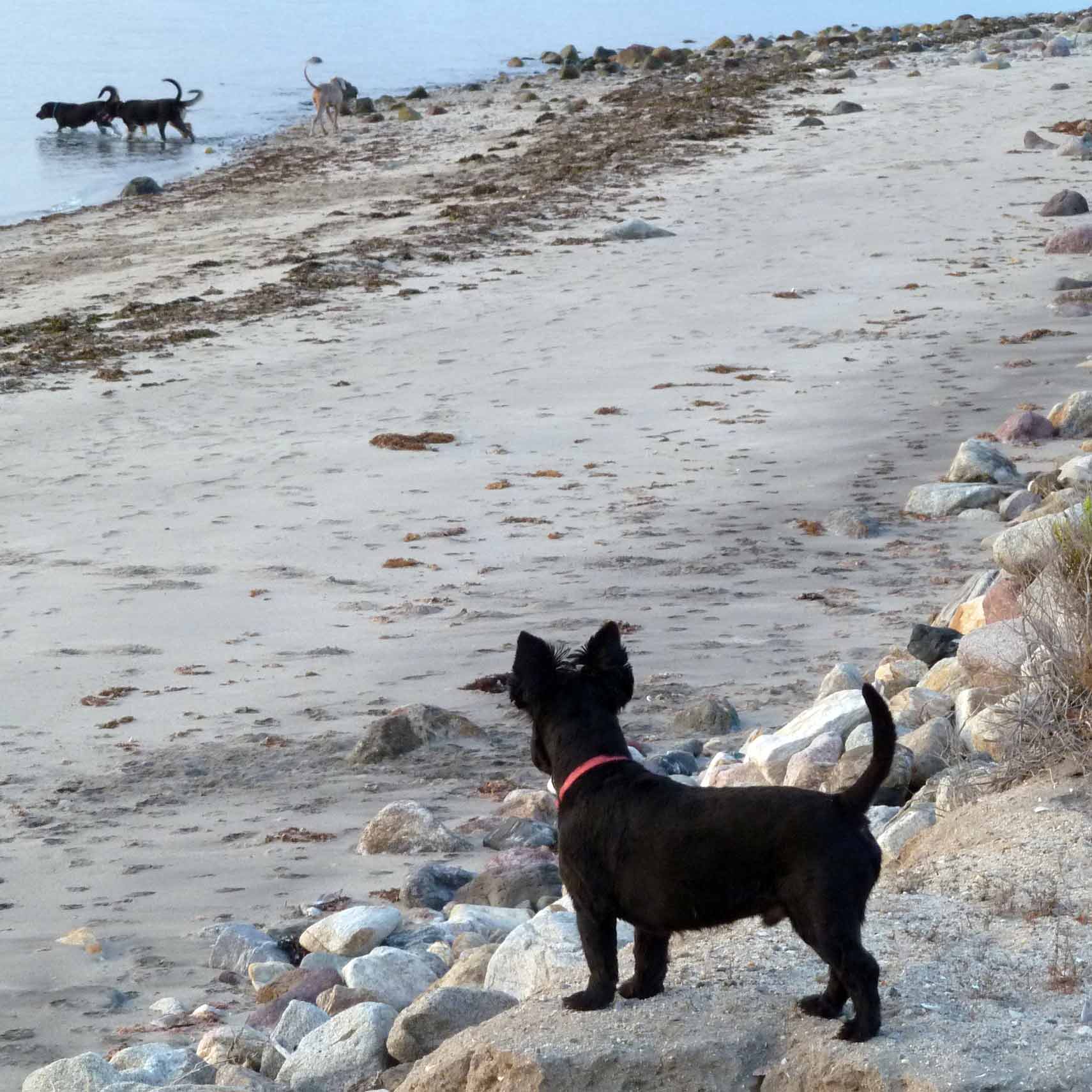When your child, say a fourth or fifth grader, changes schools in the middle of the year, it is only natural to experience some level of anxiety. Will my child fit in? Will she like the other kids? Will the other kids like her? As you sit in your parked car where parents pick up their children at the end of the school day, you watch for her face in the crowd of short people emerging after the final bell. Will she be smiling? Will she be sad? And then you see her, arms cradling books. She’s smiling!
Much the same is true with dogs. Everybody knows about the wild dogs of Mexico, roaming the streets in packs. No owners, no collars, belonging to no one but themselves, depending on their wits, instincts and each other for survival. A discarded taco here, a rotting fish carcass washed up on the beach there. Everyone has a horror story, one they’ve heard, or one they witnessed. “I had this friend who had this little poodle, Puddles... poor Puddles...” So when you bring your dog to Mexico, whether to visit or to live, you bring with you the baggage of all the Mexican dog stories you’ve ever heard. And even though you know these are rare, isolated incidents, the fact remains that they are as established in Mexican folklore as internet hoaxes. They reside in the back of your mind, fueling your fear. Will the other dogs like Cooper, my almost three-year-old, friendly ScottishTerrier? Will Coop fit in? Will he make dog buddies to run on the beach with?
I am in the process of moving Bahia de Los Angeles, a town of about 800 people, mostly Mexicans with a mix of Canadians and Americans, most of whom are seasonal escapees from the winters north of the border. Bahia, as the town is called, lies about half way down the Baja peninsula on the Sea of Cortez and is sheltered by a cluster of about a dozen islands. The largest, Isla Angel de La Guardia, is the outermost of the islands and is some 45 miles long. The other islands are much smaller. Isla Coronado, also called Smith Island, rises out of the north end of the bay and hosts a flat topped extinct volcano, a distinct landmark visible from miles away.
My house faces east and is on the beach. Not across the street from the beach, not the second lot up from the beach, not a five minute stroll to the beach, but on the beach, where the desert sand meets the clear, mysterious waters of the Sea of Cortez, the vast body of water held in place on west by the Baja California peninsula and on the east by mainland Mexico. Jacques Cousteau once characterized the Sea of Cortez as the ‘aquarium of the world’. From the back gate that marks the edge of my leased property to the seldom traveled paved road that dead ends at La Gringa, a popular camping spot north of Bahia, is 4/10 mile. Being that far from a paved road is in itself provides great relief for a dog owner.
Cooper came into my life as a ten week old pup and since his arrival has pretty much run the show. I make decisions based on whether or not the projected outcome of those decisions will be good for Cooper. If they’re good for Cooper, chances are they will be good for me, as well. So like the little girl who through no fault or intention of her own finds herself uprooted, living in a new town and attending a new school, Cooper finds himself in land with a different climate, a different pace and different dogs. Here he can step out the door and run for miles on the beach, chasing seabirds and lizards that he will never catch. When he returns from his chase he is smiling the exhausted smile of a dog completely content in the moment, as if he hasn’t really noticed that things have changed. He was in one moment, and now he’s in another. No big deal to Cooper. Cooper’s ability to completely surrender himself to the moment, wherever that moment happens to be, is what sets him apart, positions him higher on the evolutionary ladder, makes him different from me, makes him, in many ways, a superior being. Do you think Cooper gives one thought about his next meal and on which floor his bowl will sit? Does he have any doubt that there will be fresh water available when he is thirsty? Does he wonder where he will be sleeping that night? Does he worry about any of these things? All knows is that these things will be there, like the sun rising over the islands in the morning. After all, unlike a Mexican street dogs, he’s got his buddy and his buddy will make sure he gets what he needs. His buddy will make sure the sun comes up. His only job is to enjoy being a dog.
Two hundred paces south from my house is Campo Archelon, a campground I first visited a year and a half ago when researching a book, about sea turtles. If there is a pack of dogs in my neighborhood, Campo Archelon is their home. ‘Mar’ is a black lab mix. His caretaker is Tonito, the son of the late Antonio Rezendiz, the turtle expert I came to visit on my first journey to Bahia de Los Angeles. His son, also named Antonio but known as Tonito, abandoned his career as a winemaker to help his mother, Bety, run the campground after his father suddenly died. Mar was a street dog until the day her and Tonito’s paths crossed. Mar has been with Tonito ever since. Mojo, a gangly Weimerimer (spelling, I know... no internet), belongs to Marcito, a 21 year old fisherman and lifelong friend of Tonito’s. Rooster is a German Shepherd. He belongs to Marcito’s older brother Angel, also a fisherman, who lives with Erica, a marine biologist from Spain, in a trailer closer to town. A fourth dog, who looks like he could be related to Mar, is somewhat of a mystery. Not sure who his caretaker is.
These four dogs have started to appear at my house at dawn these past few mornings, loping down the beach then up the embankment. Mar and Cooper have struck up a friendship and it is Mar who leads Mojo, Rooster and the mysterious black dog to my house to invite Cooper, in their doggie way, to join them on their morning beach cruise. They play together in the yard a few minutes, then head north. Cooper follows them for a while but then stops to look back in my direction. He sees me watching him then makes a decision to return. The Gang of Four go their own way, then return twenty minutes later for another round of play on their way back to Campo Archelon. Later that afternoon, Mar returns on her own and she and Cooper spend a couple of hours nuzzling in the shade.
Like the parent who is pleased and relieved to see the smile on their child’s face after that first day in a new school, I am glad to see Cooper has made friends with the local dogs. But I also recognize that my worries about whether he would fit in with the local dog culture were mine alone. Cooper is a very confident dog. Of course he would fit in. He’s The Cooper.

